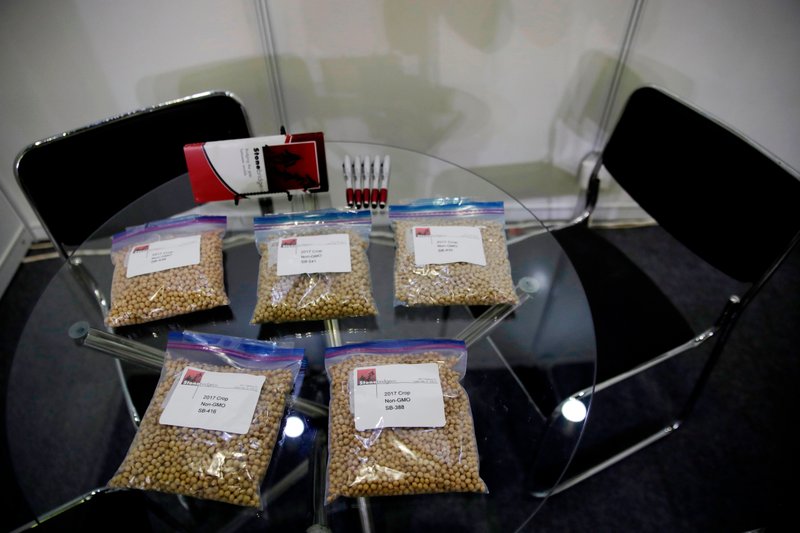WASHINGTON -- Corporate America is seeking relief from President Donald Trump's threatened tariffs on at least $50 billion in Chinese goods as negotiators work to prevent a trade war between the world's two biggest economies.
Best Buy wants televisions to be spared from the tariffs. Sanden International (USA) of Wylie, Texas, warns it will have to lay off 39 of its 431 workers if 25 percent tariffs take effect on the components it uses to make car air-conditioning compressors. SABIC, a petrochemical manufacturer, wants some building materials struck from the tariff list.
As the U.S. government on Tuesday began three days of hearings on the tariffs, Chinese Vice Premier Liu He traveled to Washington to seek a resolution to the trade dispute. A similar high-level U.S. delegation made a trip to Beijing earlier this month and returned empty-handed.
Trump had raised hopes for the latest talks by striking a conciliatory tone toward China, which he has long accused of predatory business practices that took American jobs and swelled Washington's trade deficit with Beijing. Trump offered a lifeline to ZTE, a Chinese telecommunications company that says it is fighting for survival after being hit with sanctions this month by the U.S. Commerce Department.
[LIST: See all products targeted by U.S.]
Trump campaigned for the presidency on a vow to strike a much tougher trade stance than his recent predecessors, who, he argued, had agreed to deals that gave an unfair advantage to the U.S.' competitors. The president has pointed to the U.S. trade deficit, which was $566 billion last year, as a sign of economic weakness caused by disastrous agreements and abusive behavior by China and other countries.
Trump has proposed tariffs on $50 billion in Chinese imports to punish Beijing for forcing American companies to hand over technology in exchange for access to China's vast market. China fired back by targeting $50 billion in American products, including soybeans and small aircraft, for potential retaliatory tariffs. Trump then ordered the U.S. trade representative to look for an additional $100 billion in Chinese goods to tax.
The prospect of an escalating trade war has rattled financial markets and alarmed many businesses. The American Chemistry Council has predicted that by driving up prices and hurting sales, the tariffs would wipe out 24,000 jobs at companies that make chemicals and at the companies that use them.
Yet some trade analysts have suggested that Trump's unexpected ZTE overture could give U.S. and Chinese negotiators something to work with. The Commerce Department and ZTE last year settled charges that the Chinese company sold sensitive telecommunications equipment to Iran and North Korea in violation of U.S. sanctions. ZTE agreed to plead guilty and pay about $1 billion in fines.
Meanwhile, the Trump Organization's partner in a lavish Indonesian development project boasting a six-star hotel and golf course with Trump's name has brought on a new ally: a Chinese state-owned company.
[DOCUMENT: Read full proposal from U.S.trade representative]
The Indonesian partner, the MNC Group, said Tuesday that it had struck a deal with an arm of Metallurgical Corp. of China, a state-owned construction company, to build a theme park next to the planned Trump properties.
The deal between the China-owned company and the Indonesian developer falls under the umbrella of China's Belt and Road Initiative, an ambitious plan to spread the country's money and influence around the world by financing infrastructure and other projects. The initiative is a high priority for President Xi Jinping.
Metallurgical Corp. of China, in an announcement of the deal, did not provide any details on the agreement.
Both the theme park and the Trump-branded hotel and 18-hole golf course are being developed by billionaire Hary Tanoesoedibjo, head of MNC, and packaged as part of a $500 million complex called Lido City that it has marketed as an "integrated lifestyle resort and theme park."
Hatunggal Muda Siregar, a spokesman for MNC, said the theme park and the Trump properties are separate projects within the Lido City development. The agreement with the Chinese company to build the theme park does not include any financing for the project, he said.
MNC will use a different contractor to build the Trump resort at the development and a second Trump resort and golf course on Bali, he said. The company has its own resources to finance the resort projects, he added.
Also Tuesday, Gap Inc. became the latest international company to apologize for offending Chinese political sensibilities, pulling a T-shirt featuring a map of China that left out territories claimed by the country.
The apology was triggered by complaints from consumers reacting to pictures of a Gap-branded T-shirt posted on the Chinese social media network Weibo. Users pointed out that a map printed on the shirt omitted territories claimed by China, including parts of southern Tibet, Taiwan and the South China Sea.
Gap issued an apology late Monday on its Weibo account, saying it "respects the sovereignty and territorial integrity of China." The company said the product has been pulled from the Chinese market and destroyed.
Information for this article was contributed by Paul Wiseman, Kevin Freking and Kelvin Chan of The Associated Press and by staff members of Bloomberg News.
Business on 05/16/2018
